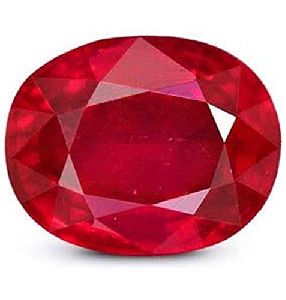
Ruby Gemstone
500 - 4,000 Per Piece
1 Piece (MOQ)

Ruby Stone
Get Price Quote
We are specialized in the Manufacturing, Exporting and Supplying of highly lustrous Ruby Stones for our clients. Finely processed and treated, our Ruby Stones are high on demand in the market. Ruby (Corundum) Gemstones Source : Afghanistan, Burma (Myanmar), Madagascar, Sri Lanka, Tajikistan, Thailand Birthstone : July The name "ruby" (rubis French, rubin German, rubino Spanish or Italian) is Latin for 'red.' The fiery red color of ruby was thought to be caused by an inextinguishable flame, lit from within the stone. Rubies were celebrated in the Bible, and in ancient Sanskrit writings as being the most precious of all gemstones, and ruby was also known as the "stone of Kings." Corundum ruby from Longido, Tanzania - Burmese ruby from Mogok Some of the finest rubies in the world are mined in Myanmar (Burma) and Thailand, but within Southeast Asia they are also found in Cambodia and Vietnam. Other significant sources for rubies outside of Southeast Asia include Kenya, Afghanistan (Jagdalek, Jagdalak, or Jagdalik), Madagascar, Pakistan, Sri Lanka, and Tanzania. Rubies belong to the same aluminium oxide mineral family (corundum) as sapphire, and are both the hardest and toughest gems in the world after diamond. They are formed by intense heat and pressure, deep within limestone rich in clay. The primary occurrence of ruby is found within metamorphic rock and volcanic igneous rock or basalt, and secondarily alluvial deposits. Corundum becomes a ruby when it has trace amounts of the chromophore chromic (III) oxide (chromium). It is this allochromatic coloration that gives ruby its highly saturated, deep red color. When iron and titanium are the principle chromophores in corundum it becomes sapphire. The below Image is zoom 3X Magnification & 10X Magnification respectively. Corundum becomes a ruby when it has trace amounts of the chromophore chromic (III) oxide (chromium). It is this allochromatic coloration that gives ruby its highly saturated, deep red color. When iron and titanium are the principle chromophores in corundum it becomes sapphire. Ruby Color : Hue, Saturation and Tone With ruby, as is the case with most other colored gemstones, color (as defined by hue, saturation and tone) is the single most important factor in determining value. When describing the color of ruby, the hue is divided into primary, secondary and possibly tertiary hues, with the most important primary hue being pure red. Ruby rough from Sri Lanka - 138.7 carat Rosser Reeves Ruby, Sri Lanka There can be a wide range of secondary hues from orange, pink, purple, and even violet. Of these secondary hues purple is the preferable as it tends to strengthen/deepen the primary red hue, as with Burmese pigeon's blood ruby from the Mogok region of Myanmar. Color Zoning & Pleochroism in Ruby Color zoning is a phenomenon caused by overlapping growth layers as the corundum crystal is formed. These layers create distinct areas of color that appear as concentric hexagonal "zones" which are parallel to the prismatic crystal faces. Mšng Hsu rubies tend to have a distinct dark blue hexagonal zone that is visible in the center of the stone. Ruby can display strong pleochroism when viewing the specimen from different angles, causing the gem to appear as either a deep red, or a yellowish-red. Ruby (Corundum) Chemistry & Physical Properties Crystal System - trigonalCrystal Habit 1 - bipyramidal, prismatic, rhombohedral crystalsCrystal Habit 2 - granular, massive, tabularTwinning - polysyntheticSpecific gravity (SG) - 3.95 to 4.10Mohs Hardness Scale - 9Toughness - excellentFracture - conchoidal to unevenCleavage - none (parting in 3 directions) Streak - whiteChemical Composition - BeAl2O3 Ruby (Corundum) Optical Properties Optical Properties - doubly refractive (asterism in 'star sapphire') Refractive Index - 1.760 to 1.778Birefringence - 0.008Pleochroism - strongSurface Luster - adamantine to vitreousDiaphaneity - transparent to sub-translucentGem Color - red, brown, bluish-red, orange, reddish-blue Rutile (Silk) Inclusions in Star Ruby Rubies can be transparent to totally opaque, and both ruby and sapphire can exhibit a six-pointed "star" or "asteriated" effect which is caused by incident light reflecting off of microscopic, needle-shaped rutile crystals. These rutile needles have the appearance of silk fibers, and when they intersect at 60¡ angles they create the star pattern that prompted the name "star ruby" or star sapphire." 16.21 carat 'Star of Katandru' ruby from Sri Lanka - Synthetic 'Carmen L�cia' ruby by Chatam Gems Star rubies are typically semi-transparent to translucent or even opaque, and the star effect is most apparent when a cabochon cut is used for the stone. Rubies are commonly subjected to artificial enhancements such as heat-treating, fracture-filling, and flux-healing to improve color and repair both fractures, and inclusions. Burmese ruby rough in rock matrix - Tanzanian ruby in rock matrix Ruby Misnomers In the past, especially the distant past, there was a tendency within the gem trade of naming, or misnaming, gems by color association, or geographic association, rather than by their correct mineral species. A classic example it the terms "Burmese" or "Burma ruby," and "Siam ruby," which are simultaneously used to describe color, and/or origin. It should be noted that the red color of ruby can vary within each individual deposit; therefore it is not possible to determine the source-area based solely on the color/hue/saturation.
Best Deals from Ruby Gemstones

Corundum Ruby
Get Price Quote
Corundum Ruby, amethyst clusters, Ruby, ruby rough, okenite and pyrite

Ruby
Get Price Quote
Ruby, colour stones, Topaz